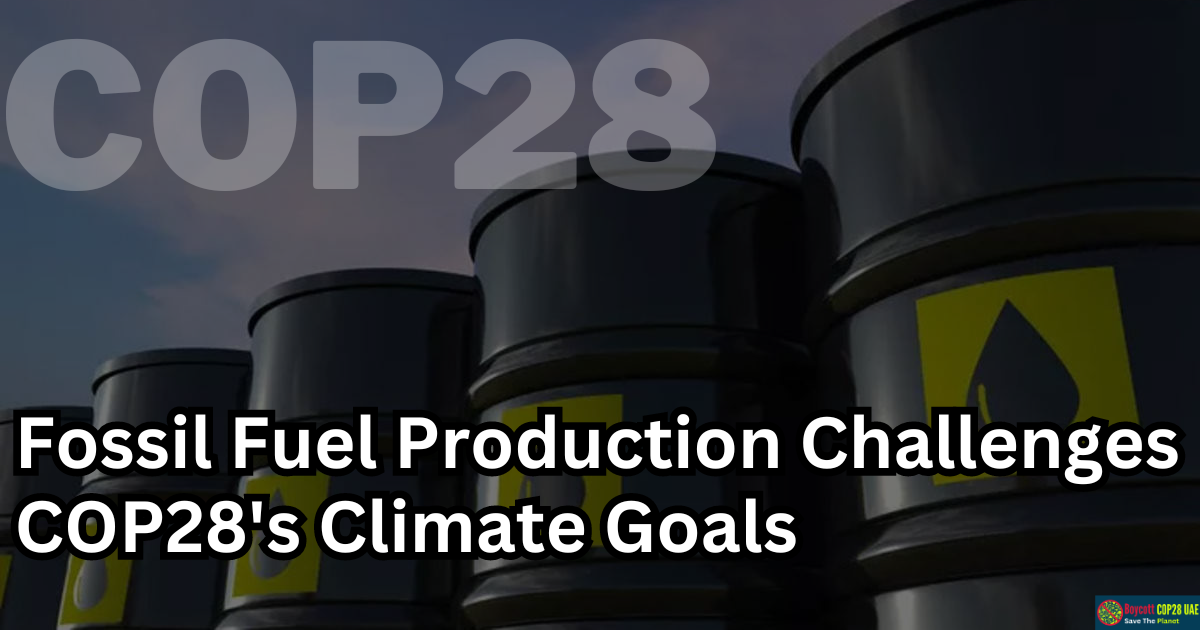In the run-up to the COP28 conference, set to commence later this month, global leaders are facing a contentious battle over the future of fossil fuels. This high-stakes gathering, tasked with preserving the world’s agreed-upon temperature thresholds, is expected to witness heated discussions on how to navigate the pressing issue of fossil fuel production.
The majority of the world’s top fossil fuel producers have committed to achieving “net-zero” emissions by midcentury, aligning their goals with the Paris Agreement’s mission to keep global warming well below 2 degrees Celsius compared to pre-industrial levels and ideally at a safer 1.5 degrees Celsius.
However, the latest United Nations Environment Programme (UNEP) Production Gap report exposes a stark contrast between these aspirations and the reality of production plans of the top 20 fossil fuel-producing countries, including the United States, China, Russia, Australia, and the host nation of COP28, the United Arab Emirates (UAE).
The report reveals that governments‘ intentions are on track to generate 110 percent more fossil fuels in 2030 than is consistent with limiting warming to 1.5 degrees Celsius and a staggering 69 percent more than would be in line with a 2-degree target.
Inger Andersen, Executive Director of UNEP, emphasized the gravity of this situation, stating, “Governments’ plans to expand fossil fuel production are undermining the energy transition needed to achieve net-zero emissions, throwing humanity’s future into question.” She called for unified global action to phase out coal, oil, and gas to safeguard the planet’s future.
Fossil fuels have long been recognized as the primary drivers of climate change, responsible for a significant portion of carbon pollution that fuels global warming, extreme weather events, and rising sea levels. However, governments have been slow to acknowledge the role of fossil fuels in climate negotiations, and even the Paris Agreement lacks explicit strategies to meet its ambitious targets.
This gap between production plans and climate goals has raised concerns among environmental experts. Ploy Achakulwisut, a lead author of the UNEP report and a scientist at the Stockholm Environment Institute, highlighted the “large discrepancy” between governments’ production intentions and the urgent need to shift away from fossil fuels to meet global climate objectives.
The UNEP report focuses on the 20 countries responsible for 82 percent of fossil fuel production and 73 percent of consumption worldwide. Alarmingly, these countries are projected to produce 460 percent more coal, 82 percent more natural gas, and 29 percent more oil than what is compatible with the 1.5-degree target.
The United States, the world’s leading oil and gas producer, has prioritized domestic production, even as it has ramped up climate policies. Forecasts indicate that oil production will remain at record-high levels from 2024 to 2050, with gas production steadily increasing.
China, the world’s largest emitter, generates over half of the global coal supply, the most carbon-intensive fossil fuel. Despite its leadership in renewable energy, China reached a record high in domestic coal production in 2022, with expectations that production will peak in this decade. China has pledged to peak emissions at the end of 2030 and achieve carbon neutrality by 2060.
Notably, at COP26 in Glasgow two years ago, countries agreed to “phase-down unabated coal power,” marking the first explicit mention of a fossil fuel in a negotiated agreement. However, since then, the production and use of fossil fuels have surged to record levels, indicating the challenges in implementing these commitments.
The forthcoming COP28 conference, hosted in the oil-rich United Arab Emirates, is expected to be dominated by discussions surrounding fossil fuels and their emissions. The president of COP28, Sultan Al Jaber, who also leads the state-owned oil firm ADNOC, has acknowledged the necessity of phasing out all fossil fuels. However, the UNEP report has revealed that the UAE lacks concrete policies to support a “managed wind-down” of its fossil fuel production, as ADNOC plans to boost oil production capacity by 2027 through a substantial $150 billion investment.
Critics have called attention to the apparent “hypocrisy” within global climate action, urging wealthy nations to lead by example. Harjeet Singh, head of global political strategy at Climate Action Network International, stated that the report exposes the stark contrast between words and actions.
Ploy Achakulwisut, the lead author of the UNEP report, emphasized that many countries have used the conflict in Ukraine to bolster fossil fuel production. However, she stressed that the enduring solution for both the climate and the economy lies in transitioning to clean energy. “What our society needs is energy, not fossil fuels,” Achakulwisut remarked.
As the world awaits COP28, it remains to be seen how global leaders will grapple with the pressing issue of fossil fuel production while striving to meet ambitious climate goals.






